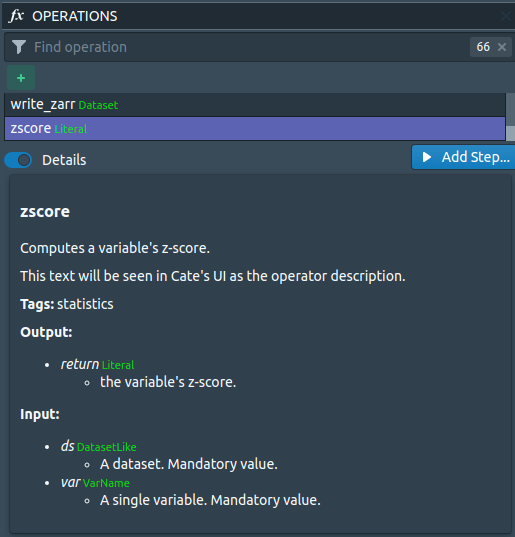12.4. Plugin Development
The possibility to extend cate through plugins is one of the main characteristics of cate. In many cases, it serves as an excellent point for third party-developers to contribute to cate or to customize cate to their needs.
Before you start, make sure that you have installed the cate sources (see here: Installing Sources). You may also find the chapter on API usage useful (api_reference) and in particular this section: Module cate.core.plugin.
12.4.1. Plugin Entry Point
Cate’s plugin functionality is a way to integrate your own code into Cate. To use it, you must implement a method called cate_init and register it in the setup.py of your project like this:
setup(
...
entry_points={
'cate_plugins': [
'<plugin_name> = <package>.<path>:cate_init'
],
},
)
When you execute python setup.py develop, the plugin is found by cate and the code in your cate_init is executed when cate is started.
12.4.2. Example: Adding an Operation
Here we show how you can add your own operation, using cate’s extension point for operations. Let’s say you have a simple operation to compute a variable’s z-score. The operation requires cate’s dedicated operation decorators to be recognized as operation. You can read about them here: Module cate.core.op.
from cate.core.op import op, op_input, op_return
from cate.core.types import DatasetLike, VarName, Literal
@op(tags=['statistics'], version='0.1')
@op_input('ds', data_type=DatasetLike)
@op_input('var', value_set_source='ds', data_type=VarName)
@op_return(data_type=Literal)
def zscore(ds: DatasetLike.TYPE, var: VarName.TYPE) -> Literal.TYPE:
"""
Computes a variable's z-score.
This text will be seen in Cate's UI as the operator description.
:param ds: A dataset
:param var: A single variable
:return: the variable's z-score
"""
ds = DatasetLike.convert(ds)
var = VarName.convert(var)
variable = ds[var]
mean = variable.mean(dim='time', skipna=True)
std = variable.std(dim='time', skipna=True)
return Literal.convert((variable - mean) / std)
Say you have this code in a module named zscore.py. You can then refer to it from your package’s __init.py__ like this:
def cate_init():
# Plugin initializer.
# Left empty because operations are registered automatically via decorators.
pass
from .zscore import zscore
That’s all. We did not need to implement cate_init here, as the relevant part is that its mere presence causes that the module is loaded at runtime, and therefore the decorators register the operation.
In Cate, the operation will then appear like this:
